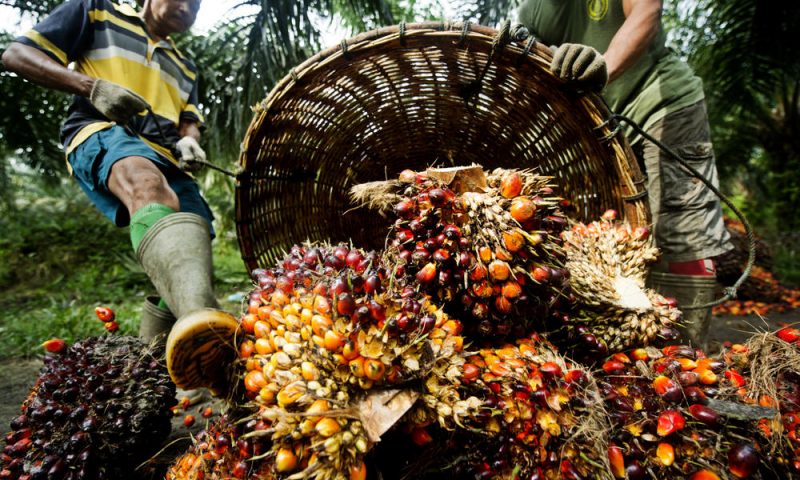Indonesia believes its ISPO standard for the palm oil industry, if enforced, could help cut back on environmental destruction. Meanwhile, the European Union makes its own demands.
Most of the world is moving forward to prioritize environmental sustainability. A recent resolution made by the European Parliament in early April, regarding sustainable palm oil, may have prompted further discussions among industry stakeholders.
Seeing eye-to-eye with Europe’s accusations about the destructive nature of the palm oil industry at large, Aziz Hidayat, head of the Indonesian Sustainable Palm Oil Commission (ISPO), is now driven to build a better palm oil industry in the archipelago.
One way is to make sure all palm oil producers in the nation are certified by the ISPO – no easy task.
Despite inherent challenges, the certification aims to create more sustainable palm oil industry practices in Indonesia and reduce greenhouse gas emissions from the country as a whole.
Currently, the total area used for palm oil plantations in Indonesia is approximately 11.3 million hectares. So far, only 1.4 million hectares have met ISPO standards. According to General Director of the Ministry of Agriculture Bambang MM, there are at least 1,600 palm oil businesses in the archipelago. Of that number, 535 companies have submitted audit reports for certification and only 226 companies have actually been certified by the ISPO.
Of the 535 companies that have thrown their hats into the ring, the certification body put 11 of them on the waiting list, as they have not yet met ISPO’s standards. An ISPO certification requires companies to have an Environmental Impact Analysis permit and a Certificate Letter for Cultivation (STDB).
On April 11, 2017, 319 palm oil farmers in the Pelalawan district of Riau received ISPO certifications. Interestingly, Riau is the first province to have its palm oil farmers certified by the ISPO. This is likely the result of it being routinely one of the main sources of Indonesia’s annual haze crisis caused by irresponsible palm oil companies. The farmers were trained by the Sustainable Palm Oil Initiative (SPOI) in partnership with United Nations for Development Programme (UNDP).
Not limited to training, the UNDP and SPOI also helped farmers with certifications for land and other legal matters. Director of Processing and Marketing of Estate Crops at the Ministry of Agriculture – and Secretary of the ISPO Commission – Dedi Djunaedi targets 70 percent of palm oil products in Indonesia to be ISPO-certified by 2020.
Hidayat said that the ISPO certification is aligned with the global need to encourage plantations to comply with government regulations. Theoretically, it would also incentivize smallholder farmers and entrepreneurs to take actions that would protect the environment, even if only for the sake of remaining competitive.
“What needs to be done now is [we need] to improve ISPO acceptability internationally, because our standard aligns with global needs,” explained Hidayat.
That said, the European Parliament does not acknowledge the archipelago’s ISPO standard. Its resolution aims to gradually reduce the use and distribution of vegetable oil by 2020. The vegetable oil business is seen as one of the main causes of deforestation around the world, and Europe is calling for a single certification scheme for all palm oil products that enter the European Union (EU).
As the largest and most prominent palm oil producers in the world, Indonesia and Malaysia oppose the resolution and see it as a discriminatory item. The biggest importer of Indonesian palm oil at the moment is India with an average of 5.7 million tonnes of palm oil per year. Meanwhile, last year countries in the EU noted a 3 percent demand increase from 2015. In 2016, 4.4 million tonnes of palm oil were imported by the EU.
Chairman of Indonesian Palm Oil Association Joko Supriyono claimed that the palm oil resolution made by the European Parliament is tainted with business and political issues. According to him, any standards made by the Indonesian government will most likely be rejected.
“ISPO is a mandatory standard that was implemented by the Indonesian government. Even if we fully implement ISPO 100 percent, Europe still might not acknowledge that. They have their own standard. It is nonsense to say sustainability is the issue here. Evidently, we have ISPO and they don’t want it,” said Supriyono in an interview with DetikFinance.
Although not yet implemented, the resolution clearly outraged some parties. Indonesia’s Minister of Agriculture Andi Amran Sulaiman has yet to evaluate the trading partnership with Europe, particularly with regard to palm oil and biodiesel segments.
According to Sulaiman, Indonesia is currently converting 3.2 million tonnes of palm oil to B-20 biodiesel. Meanwhile, Europe demands 7 million tonnes of palm oil. Sulaiman urged companies not to export Indonesian palm oil to the continent, saying that the palm oil is better to be used as biofuel. “We still have B-30 which requires at least 13 million tonnes of palm oil. That means we will reduce exports in palm oil and use it for biodiesel,” said the minister.
Offering a calmer solution, Executive Director of the Indonesian Vegetable Oil Refiners Association Sahat Sinaga suggested using the situation as momentum to improve the local palm oil industry. He added that aside from improving plantation practices, Indonesia should also improve its domestic market. According to him, Indonesia may want to consider broadening its markets in Asia and Africa. “Do not be too focused on the European market,” suggested Sinaga.
The resolution was approved by 640 European Parliament members, with 18 members rejecting it and 28 abstaining from the vote. The future of the palm oil industry in Indonesia has yet to be seen. However, it can be assured that with ISPO certification, Indonesian palm oil industries are becoming more transparent and, with any luck, friendlier to the environment.
As Bambang said himself, “With the certification, ministries are obliged to supervise plantation industries on everything from preparations and pest control to the Crude Palm Oil process itself. The ISPO certification shows the world that palm oil products can be environmentally friendly.”




